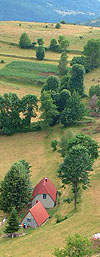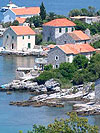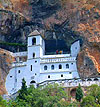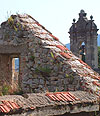|




|
Former
Yugoslavia
TFF
began to do conflict-mitigation and peace education in all parts
of the former Yugoslavia in September 1991. Today we monitor,
do fact-finding and write predominantly about Serbia and its
Kosovo/a province, Montenegro, as well as Macedonia and the
international community's policies in the region.
Members of the TFF team - among them Jarman, Sommelius, Schierup,
Schultz, Galtung and Wiberg - have visited the area hundreds
of times, some since the 1960s. We have produced conflict analyses,
conflict-mitigation, alternative peace plans, early warnings
and series of education programs and skills training in peace
by peaceful means for civil society groups in most of the republics.
Thus,
what you read at TFF is based on multi-year, personal, in-the-field
experience and book knowledge and on thousands of interviews
in the field with all sides before, during and after the wars.
The foundation has produced quite a few books, book chapters
and articles. Team members have participated in media debates
and used their experiences in numerous public lectures and courses
around the world.
>
When you access an older document below or in the archive, do
not click on its top menu when you have read it. Return to this
page and use the left menu.
Videoteque
The Balkans
Articles 2009-2010
Johan Galtung, October 7, 2010
The future of what was once Yugoslavia New models for each, several and all units of that torn-apart Yugosphere
Biljana Vankovska, November 30, 2009
Newspaper column by Mr. Solana and Mr. Rehn
Is this a mafia-type proposal or just an ordinary blackmail - by these representaitves of European democracy?
Biljana Vankovska, November 27, 2009
Open Letter to Colleagues: Another European deficit: Does responsible scholarhip exist?
Håkan Wiberg, November 27, 2009
Greece and Macedonia: What's in a name?
Biljana Vankovska, Jul 23, 2009
Kosovo - current situation and bleak prospects
Jan Oberg, February 11, 2009
The Serb minority's situation in Croatia 17 years after the war broke out
International peace-prevention and Croatian nationalism in perspective
See also Oberg's
Re-visiting Croatian nationalism (Part A)
Re-visiting Croatian nationalism (Part B)
Aleksandar Mitic et.al., January 19. 2009
Kosovo Compromise
With lots of pertinent, well-researched articles on the Balkans - and a new issue of the Kosovo Compromise Journal.
Articles 2008l
Vasiliki Neofotistos, October 7, 2008
“The Balkans' Other within”: Imaginings of the West in the Republic of Macedonia
Read about her analysis in the History and Anthropology journal.
Jan Oberg, September 19, 2008
Re-visiting Croatian nationalism (A)
Or, how nationalist can a country be that wants to join the European Union?
Jan Oberg, September 19, 2008
Re-visiting Croatian nationalism (B)
Observations in text and pictures from driving around in the country
Aleksandar Mitic, Setpember 12, 2008
"Welcome to Kosovossetia"
The Kosoco Compromise Newsletter
August-September 2008
Biljana Vankovska, August 23, 2008
Kosovo - Macedonia's perspectives and dilemmas
Jan Öberg, Aftonbladet, 10:e augusti, 2008
Karadzic redan dömd - i medierna
Aleksandar Mitic, Iran's Press TV, July 28, 2008 - Video
TV talk-show: “Kosovo six months on”
Together with Dr. Dusan Relic in Berlin
Jørgen Johansen, Sydsvenska Dagbladet, 24:e juli 2008
Olika inför lagen. Segrarnas dubbelmoral hindrar verklig rättvisa från at skipas.
Kring arresteringen av Radovan Karadzic.
Sören sommelius, Helsingborgs Dagblad, 22:e juli 2008
Viktig bit i fredspusslet på plats.
Om gripandet av Radovan Kradzic.
Aleksandar Mitic, Institute 4S, May 15, 2008
Kosovo Compromise 2008
The best single collection of world media clippings, analytical articles, arguments pro et con of the main issues. For those who are interested in getting behind Western political hype and mainstream media uniformity.
Aleksandar Mitic, Institute 4S, May 15, 2008
In Press.
Justifying Kosovo's recognition: Between the eccentric and the absurd...
Jan Oberg, May 15, 2008
Kosovo - what the international 'community' never understood
Six rather simple themes which - if having been managed differently - could have produced a much better Balkans than today's.
Biljana Vankovska, May 15, 2008
1. Indecent proposal to Macedonia: Give up your name to get into NATO.
One of five newspaper columns that give offer insights on how the democratic West practises democracy in small states it has earlier contributed to destroy. This one on an attempt at blackmaiing...
Biljana Vankovska, May 15, 2008
2. To be or not to be - Macedonia
Biljana Vankovska, May 15, 2008
3. Macedonia after NATO's Bucharest Summit
Biljana Vankovska, May 15, 2008
4. Macedonia and Klein's Shock Doctrine
A TV interview never broadcasted
Biljana Vankovska, May 15, 2008
5. Interview with the Italien newspaper “Left Avvienimenti" in May 2008.
Michel Chossudovsky, March 1, 2008
The UN contributed to the establishment of a Mafia-State in Kosovo
Jan Oberg, February 29, 2008
Can the EU become a peace-maker in the world? In Kosovo?
Johan Galtung, February 21, 2008
Kosova's independence - a crime against the Serbs and a crippling of the United Nations
Jan Oberg - February 20, 2008
Our experiment with the media on Kosovo's secession
Kosovo Compromise 2008
Boomerang - the effects of the unlawful recognition of Kosovo's secession
Michel Chossudovsky, February 18, 2008
EU police and military intervention to enforce secession from Serbia
Jan Oberg, February 17, 2008
Kosova's secession - Part 1
What is conveniently forgotten?
Jan Oberg, February 17, 2008
Kosova's secession - Part 2
What can happen after this?
17 possibilities - and when will they ever learn?
Radmila Nakarada, February 17, 2008
A non-European answer to a European problem
Biljana Vankovska, February 17, 2008
So hypothetical about Kosovo: A view from Macedonia
Aleksandar Mitic, February 17, 2008
The Kosovo Compromise 2008
Kosovo Compromise must-see online CD Rom
Tamara Tsikhistavi, February 17, 2008
Thoughts on Kosovo: Are we seeing a new world map with lots of new borders and states?
Michel Chossudovsky, February 12, 2008
Kosovo: The US and the EU support a political process linked to organized crime - Prime Minister Hashim Thaci is part of a criminal syndicate
Articles 2007
Jan Oberg, November 22, 2007
Kosovo - failed international conflict-management.
Why we will soon see a new chapter in the tragedy called Kosovo and why it is not predominantly the fault of the local parties. Will the media do it differently this time?
With links to must-read resources.
Jan Øberg, 22. november 2007
Den kommende tragedie i Kosovo - forfejlet konflikthåndtering. (Med resourcer til forståelse)
Det kan på ingen måde gå godt i regionen i de næste få måneder og du vil måske gerne kende nogle af årsagerne hertil. Fremtiden har brug for én ting fremfor noget andet; en anerkendelse af at det internationale samfund selv er medansvarlig for den frygtelige situation i Kosovo og Bosnien og at det dybest set har sat sig selv i politisk fængsel begge steder. En ny begyndelse baseret på en række åbne, ærlige lærdomme er en nødvendighed. Jeg frygter det ikke sker.
Aleksandar Mitic, October 1, 2007
Kosovo Compromise
Brand new homepage on Kosovo's future status and what happens in the negotiation process. Q & A of the most important themes and daily updates from the world press.
Aleksandar Mitic, In Press, September-October 1, 2007
Kosovo Status Crisis - Why Negotiate (PDF)
Leading newsletter about Kosovo from the S4 Institute.
Aleksandar Mitic & Jan Oberg, July 19, 2007
A new beginning for Kosovo
During the last almost 20 years, the Kosovo conflict has been handled by the international community on the basis of three counterproductive assumptions. One, it was believed that it could be dealt with as a special case. Two, it was seen as a political power issue rather than a case for professional conflict-resolution. Three, there was a belief that the lack of mediation could be covered up by NATO’s “peacemaking” bombings in 1999. Albanians and Serbs have all reason to feel cheated by the international community. It must now make a new beginning.
See interview with the authors at "Telepolis" - Zeit für einen Neubeginn.
Also on the EUobserver.
Biljana Vankovska, July 12, 2007
The framework Ohrid Agreement as a cradle of federalization
For a person who grew up in a federation (in its ‘golden years’ bought with foreign credits and loans from IMF), I can’t see why I should be scared of federalization - except for the still strong association with the bloody dissolution of Yugoslavia. ‘Badinter’ is nothing that should bother either ethnic Macedonians or Albanians. But let’s finally invite the real Mr. Badinter to Macedonia and let’s ask for his opinion about perspectives of the country in which he is called on literally every day!
Jan Oberg, June 20, 2007
Why "unique" Kosovo must become independent
Look back a bit to the 1990s and you will understand the incredibly biased articles by the bombing enthusiasts of 1999.
Sören Sommelius, 15:e juni 2007
Resa i efterkrigstidens Bosnien och Kroatien (2):
Jasenovac - Jugoslaviens Auschwitz
Sören
Sommelius, 4:e juni 2007
Resa i efterkrigets
Bosnien och Kroatien (1)
Biscani, Priejor, Omarska
Johan
Galtung, Jan Oberg and Hakan Wiberg, May 11, 2007
Ahtisaari's
Kosovo proposal: Unfair and peace-preventing
The western world has a free press, and a free press can have
many perspectives. Why, then, has the story of Kosovo been so
uniform the last 15 years? And why is Martti Ahtisaari’s
so-called mediation of Kosovo’s future status – and
the media coverage of it – so partial and non-objective?
The article contains a quiz and we invite your answers and comments
about the article as well as the way media deal with conflicts
and peace.
Aleksandar
Mitic, 11:e maj 2007
Europa har förlorat
inflytande i Kosovo
EU ser ut att stå inför stora risker när det gäller
Kosovo: I säkerhetsrådet är läget låst,
inom EU råder delade meningar och det finns inte minsta
spår av att Serbien skulle godta Martti Ahtisaaris plan att stycka av Kosovo från Serbien.
Aleksandar
Mitic & Jan Oberg, May 9, 2007
Kosovo's
Pandora Box
One of the most dangerous and unrealistic ideas circulating today
in international politics consists of considering the Serbian
province of Kosovo as a “unique” case. Under such
thinking, Kosovo’s independence should be imposed on Serbia
in breach of all international laws and UN SC 1244.
Aleksandar
Mitic, May 2, 2007
The EU has long
lost its leverage in Kosovo
One thing is now clear: there will be no UN Security Council resolution
based on the core of Ahtisaari's proposal because there is simply
no agreement on why Kosovo should be the first case in the 62-year
long history of the UN in which the body legitimizes a dismemberment
of a member country.
Jan Öberg, 1:e maj 2007
Kosovo behöver en lösning som alla kan leva med
Refuserad debatt-artikel till Sydsvenska Dagbladet...
Richard
Falk, April 6, 2007
The Genocide in
Bosnia: Lawyers' justice versus justice
Widespread disappointment has greeted the near unanimous decision
of the World Court in The Hague, formally known as the International
Court of Justice, to the effect that Serbia was not guilty of
genocide in Bosnia during the 1990s. The outcome although troubling
in some aspects should not be viewed as a
defeat for the Bosnian side.
Sören
Sommelius, 22:a mars
Balkan i
ögonhöjd
Recension av boken "Balkan – gi meg en dag …
skildringer fra Balkan.
Johan
Galtung, Jan Öberg & Håkan Wiberg,
Aftonbladet, 5:e mars 2007
"Ohållbart
om Kosovo"
Ahtisaaris plan är orättvis och kommer att leda till
ökat våld. Varför är Martti Ahtisaaris så
kallade medling om Kosovo och presstäckningen av denna så
partisk och så lite objektiv?
Ett
litet stycke svensk Kosovo-historia från 1999...
Aleksandar
Mitic, February 2007
In Press Journal
- a lot about Kosovo, 1.2 mb
Galtung,
Øberg & Wiberg,
Jyllands-Posten, 28. februar 2007
En uholdbar plan
Martti Ahtisaaris forslag til Kosovo-provinsens fremtidige status
er fredsforhindrende, mener forfatterne, der er tilknyttet den
Transnationale Stiftelse for Freds- og Fremtidsforskning, TFF.
De har fulgt udviklingen på Balkan i over 30 år.
Aleksandar
Mitic & Jan Oberg
The International Herald Tribune, February 22, 2007
The
Kosovo example
A much shortened version - but accompanied by many letters in
the paper as well as a pro-independence editorial.
Soren
Sommelius, February 9, 2007
Revisiting Pakrac,
Croatia - the town where the war began in 1991
A connoisseur's sad account 16 years later. When reading his account
and seeing his pictures, you wonder why the war broke out and
whether it brought anything good to anyone...
Jake Lynch,
February 6, 2007
Defining
independence is critical to new statehood
Discusses what it
means to be independent, in the wake of the Ahtisaari report on
Kosovo's future. It's also a moment of truth for a famous or infamous
bit of coercive diplomacy from Washington.
Sören
Sommelius, 6 januari 2007
Besök i Pakrac
i Kroatien där kriget började i 1991
En kännares trista besök
16 år senare. Texten o bilderna får läsaren att
undra: Varför började kriget här och kom det överhuvudtaget
något positivt ut av det för någon?
Articles 2006
Vasiliki
Neofotistos, December 13, 2006
Beyond
stereotypes: Violence and the porousness of ethnic boundaries
in the Republic of Macedonia
The processes that are described in this article shed light on
how so-called "inter-ethnic tensions" can be negotiated
in daily life and how local society, at first sight fraught with
negative ethnic stereotypes, can prove resilient towards ethnic
violence. It is published in History and Anthropology,
Volume 15, Number 1, March 2004, pp. 1-36(36).
Håkan Wiberg
& Jan Oberg, TFF, September 22, 2006
Montenegro
- A state is born
Gives a historical
account and analyses the independence as a result of re-defining
identities, re-writing history, of the international game with
Milosevic, of strange voting rules and referendum criteria. It
may go well for Montenegro, but there is no guarantee.
Aleksandar Mitic, TFF
Associate, September 21, 2006
Kosovo:
The power of compromise
A concise argument in favour of fairness and international law,
not the least UNSC 1244. He also guides you through the intellectually
poor views of the mediator, Mr. Ahtisaari, and the Contact Group.
Mitic outlines a win-win solution that will last longer than the
present idea of imposing independence on Serbia.
Aleksandar Mitic, TFF
Associate
Kosovo 2006: The Making
of a Compromise
A brand new CD on a) Kosovo Yesterday. A Disputed Land; b) Kosovo
Today. UNMIK Titanik and c) Kosovo Tomorrow. The Making of a Compromise.
If you want to inform yourself about the main story developing
in European affairs this autumn - the future of Serbia and Kosovo
- this is where you should begin. At Cafe
Babel you find the first introduction. And more here about
Mitic.
Aleksandar Mitic,
June 26, 2006
End
Balkanization now!
About independence for Montenegro and, perhaps, Kosovo. Mitic
argues that this can be dangerous for the region as well as stimulate
separatism elsewhere. Why is there so little interest in the media...
"Can there be any more "taboos" if there are no more principles?"
- he asks.
Biljana
Vankovska, June 26, 2006
The
ageing EU Lady's hormonal problems: Human Security for chameleons
An impassioned discussion of the EU (Venus) and US (Mars), the
militarization fo the EU disguised as 'human security' and what
could be in it - if anything - for Macedonia and other Balkans
countries. Since governments can't and won't, we better create
human security ourselves, warns the author.
Biljana
Vankovska, April 6, 2006
The
role of the Ohrid Framework Agreement and the peace process in
Macedonia - A reality check
The Macedonian case of conflict mitigation could and should indeed
be taken as a paradigmatic and very didactic one. One could easily
learn a lot on how not to carry out conflict prevention, and even
more - on how not to rush into claiming a fantastic success story
in post-conflict reconstruction. But the international community
so-called really needs some success stories...
Jan Oberg,
March 13, 2006
The real story:
How Milosevic was much more evil than you ever knew
The media call him a butcher and compare him with Stalin, Mao
and Hitler. That's right, but they don't give us the the broader
picture. At his death I choose to tell you how I believe
he alone caused all the troubles - and I have met him. The evil
of Milosevic is grossly understated by Western politicians, diplomats
and media. Indeed, I've found reasons to believe that he can be
tied to the genocides in Rwanda and Burundi too.
I've been a witness. These are my findings. I can no longer keep
silent.
Part 1
| Part
2 | Part
3
Kai Frithjof Brand-Jakobsen,
March 1, 2006
Romanian
and U.S. militarism increases insecurity in South Eastern Europe
and the Black Sea Region
The agreement recently signed between Romania and the United States
represents one of the greatest political failures in Romania in
recent decades. It is rooted in the absence of responsible politics
and a reliance on increasing militarism and aggressive military
engagement in a broader US dependent alliance. The author gives
you the criticism as well as the alternative: a peace policy program.
|
Archive
1991-2005
Use the search engine to access pre-2006
articles. Later we shall list them neatly here by years.
Articles
on Macedonia 1999-2004
Features
Quality
articles - thought-provoking, informative, or "different"-
written by people who are not TFF Associates. We recommend and
share them with our readers.
The
TFF Former Yugoslavia
Theme and Action Group, TAG
Aleksandar
Mitic, TAG leader
Jan
Oberg, Co-ordinator
Peter Jarman
Radmila Nakarada
Soren Sommelius
Kerstin Schultz
Svetozar Stojanovic
Biljana Vankovska
Håkan Wiberg
Johan Galtung
Vasiliki Neofotistos
Videoteque
The Balkans
Activities
2006-2007
• Brand new homepage in October 2007
Kosovo Compromise
• Re-publish a number of earlier articles on Kosovo, e.g.
the Kosovo
Solution Series (2005) as Kosovo will hit the headlines in
autumn 2006.
• Produce a few analyses about Kosovo/a, Serbia, Montenegro
and Macedonia in particular (depending on developments there).
• Promote Mitic's seminal CD "Kosovo
2006: The Making of a Compromise".
• Write articles about Kosovo/a for leading international
media on why compromise in Kosovo/a is both possible and better
than complete independence or re-integration into Serbia.
•
Monitor UN meetings and Serb-Albanian negotiations in Vienna among
the parties.
• Galtung, Wiberg and Oberg work on their book "Yugoslavia
- What Could Have Been Done?"
•
Explore Peace Journalism options in this case. One possibility
is to focus on/give a course on PJ (with other TFF Associates
of course), web-based, a co-operative effort between Mitic' S4
Institute and TFF and possibly others.
• Produce something graphical and educational for our respective
websites, e.g. highlighting human security issues, perhaps make
a human security map for the Balkans...
• Place Kosovo and the surrounding issues in the context
of EU policies, beginning with the wide circulation of Jan Oberg's
booklet "Does the European Union Promote Peace? Analysis,
critique and alternatives"
• Continue to publish articles and other materials by TFF
Associates relevant to the former Yugoslav region.
Aleksandar
Mitic & Jan Oberg
The International Herald Tribune, February 22, 2007
The
Kosovo example
Jan
Oberg & Aleksandar Mitic, IHT
December 4, 2005
The
status of Kosovo
International Herald Tribune
|
